|
|
|
Sort Order |
|
|
|
Items / Page
|
|
|
|
|
|
|
| Srl | Item |
| 1 |
ID:
181811
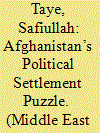

|
|
|
|
|
| Summary/Abstract |
The rapid collapse of the Afghan Republic in August 2021 was in part the result of two decades of disintegrating political parties at the hands of former Presidents Karzai and Ghani. After the 2001 US intervention, political parties did not play a significant role in the politics of Afghanistan. The country’s nascent democracy experienced major shifts in the aftermath of the US intervention, largely concerning the behaviour and structure of its parties, which impacted the government’s prospects of reaching a political settlement. In this period, politics began to shift toward a more elite-centric model. By applying a political settlement conceptual framework and case studies, especially with reference to the presidential elections, this article argues that the transformation to an elite-centric model intensified political rivalries in Afghanistan. The resulting polarisation consequently had decreased Afghanistan’s chances of reaching a political settlement, an essential component of state-building in this fragile, linguistically fragmented country with multiple politico-military factions.
|
|
|
|
|
|
|
|
|
|
|
|
|
|
|
|
| 2 |
ID:
094843
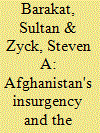

|
|
|
|
|
| Publication |
2010.
|
| Summary/Abstract |
The international intervention in Afghanistan has contributed to entrenched state weakness and rising insecurity. Despite increased references to the need for reconciliation with the Taliban and a political solution to the ongoing conflict in Afghanistan, few specifics have been offered by academics or policymakers. Building on research into conflict resolution and an analysis of the composition and motivation of the insurgency, this article addresses this gap by asking whether conditions are currently "ripe" for a negotiated settlement, how "ripeness" may be achieved, and, once achieved, how a political settlement might best be pursued.
|
|
|
|
|
|
|
|
|
|
|
|
|
|
|
|
| 3 |
ID:
127077
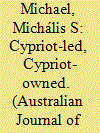

|
|
|
|
|
| Publication |
2013.
|
| Summary/Abstract |
Cyprus occupies an unenviable position among a group of intractable international conflicts which transcend their national borders and whose resolution has eluded third-party mediation. The Cyprus dispute has preoccupied theorists and practitioners of conflict resolution ever since the United Nations stationed its peacekeeping force on the island in 1964. Even attempts by the United Nations to revitalise the Cyprus talks following the 2004 referendum on the Annan plan have not yielded satisfactory results. For decades, the Cyprus problem has challenged conventional international analysis and defied traditional approaches to negotiation and peacemaking. This article grapples with the question of why this conflict has not been resolved despite endless negotiations. By extrapolating three seemingly distinct variables-Cypriotisation, Europeanisation and post-Kemalism-this article alludes to changes in the conflict's contextual parameters that are conducive to a political settlement.
|
|
|
|
|
|
|
|
|
|
|
|
|
|
|
|
| 4 |
ID:
182457
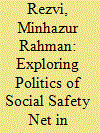

|
|
|
|
|
| Summary/Abstract |
The purpose of the study is to explore the politics of beneficiaries’ selection and resource distribution of social safety net (SSN) programs and how local elites and political groups establish political settlement by using it as a tool. In developing countries, formal systems are not strong enough and elites’ groups use their power to create informal institutions for securing their interests. As other studies have shown, informal politics influence the processes of selection and distribution of SSN programs in Bangladesh. The study is qualitative in nature and the selected research area is Rajakhali Union in Cox’s Bazar District. The study found that informal systems (e.g. clientelist politics, political affiliation, personal conflicts, and kinship) determine the selection and distribution of SSN programs. The Union Parishad (UP) members distribute the SSN programs to their ineligible clients (supporters, local elites, and political groups) by bypassing the formal systems for strengthening clientelist relations, increasing their legitimacy, stabling their power, and increasing their vote banks. They (UP members, political elites, and local elites) have allowed introducing more informal structures that better serve their interests. They have used the SSN programs as a tool for establishing the political settlement (distribution of power between UP members and local elites).
|
|
|
|
|
|
|
|
|
|
|
|
|
|
|
|
| 5 |
ID:
188897
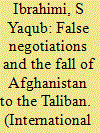

|
|
|
|
|
| Summary/Abstract |
This paper examines the dark side of Afghanistan’s peace negotiations that started under Donald Trump’s South Asia policy in Doha, Qatar, in September 2018 and ended, without a meaningful success, in December 2020. The paper examines both the United States–Taliban and the intra-Afghan negotiations and discusses the impact of the false negotiation behaviour by the Taliban and the Afghan government on the peace talks. It also explains how, in the absence of conditions for a political settlement, parties to the conflict acted as false negotiators, which resulted in the failure of efforts to launch a genuine peace process and in the Taliban’s military domination of Afghanistan.
|
|
|
|
|
|
|
|
|
|
|
|
|
|
|
|
| 6 |
ID:
188907
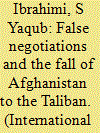

|
|
|
|
|
| Summary/Abstract |
This paper examines the dark side of Afghanistan’s peace negotiations that started under Donald Trump’s South Asia policy in Doha, Qatar, in September 2018 and ended, without a meaningful success, in December 2020. The paper examines both the United States–Taliban and the intra-Afghan negotiations and discusses the impact of the false negotiation behaviour by the Taliban and the Afghan government on the peace talks. It also explains how, in the absence of conditions for a political settlement, parties to the conflict acted as false negotiators, which resulted in the failure of efforts to launch a genuine peace process and in the Taliban’s military domination of Afghanistan.
|
|
|
|
|
|
|
|
|
|
|
|
|
|
|
|
| 7 |
ID:
180046


|
|
|
|
|
| Summary/Abstract |
In post-war transitions, how do centre-periphery relations change, and what is the role of actors at the margins of the state in negotiating these changes? This article explores these questions by examining Nepal’s post-war transition following the 2006 Comprehensive Peace Agreement focusing on three borderland districts (Saptari, Bardiya and Dolpa). The article analyses contrasting dynamics in these districts to highlight changes in centre-periphery relations across several areas including state reform, the economy, and transitional justice. The analysis shows how post-war transitions often generate new forms of contentious politics, and how groups at the margins can push back against emerging political settlements to reshape politics at the centre. The ambiguities and contradictions inherent to these processes are explored, with state restructuring processes susceptible to elite capture, and re-balancing of power between centre and periphery also coinciding with continuing or increased divisions and inequalities within borderland regions.
|
|
|
|
|
|
|
|
|
|
|
|
|
|
|
|
| 8 |
ID:
142523
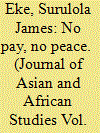

|
|
|
|
|
| Summary/Abstract |
The peace accord between the Federal Government of Nigeria and the Niger Delta (ND) militants, within the framework of the 2009 amnesty programme, immediately yielded positive results. Daily oil production, which had drastically declined to an all time low of 1.4 million barrels, soon shot up to 2.2 million barrels as the deal restored relative calm in the region. In recent times, however, the seeming peace in the region has disappeared, to the consternation of those who had touted a DDR approach to the conflict in Nigeria’s oil ‘republic’. Kidnapping, for ransom in the region, shifted from high profile abduction to anyone in society that can offer a price. More than any other explanation, this article locates the resurgence of violence in the region in the fault lines of the DDR programme implemented in 2009. The author contends that the deal was a ‘cash for peace’ programme cloaked in ‘amnesty’; which has inadvertently created a violence appeal for those who seek a slice of the so-called ‘national cake’.
|
|
|
|
|
|
|
|
|
|
|
|
|
|
|
|
| 9 |
ID:
100280
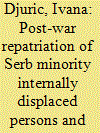

|
|
|
| 10 |
ID:
108365
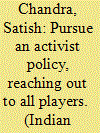

|
|
|
| 11 |
ID:
184839
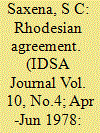

|
|
|
| 12 |
ID:
089651
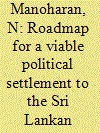

|
|
|
|
|
| Publication |
2009.
|
| Summary/Abstract |
Since the LTTE is no more, which actor should be in a position to negotiate with the Sri Lankan government on behalf of Tamils? The LTTE did not allow or accommodate different political view points. It focussed all its energies on military strategy, but forgot to foment a political strategy
|
|
|
|
|
|
|
|
|
|
|
|
|
|
|
|
| 13 |
ID:
118938
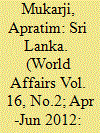

|
|
|
| 14 |
ID:
175413
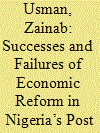

|
|
|
|
|
| Summary/Abstract |
There are limitations in the explanatory power of prevailing theories on the political economy of Africa’s growth without industrialization that emphasize the resource-curse, ethnicity, neopatrimonialism, and the developmental state. This article uses a political settlements approach to explain the institutional underpinnings of Nigeria’s economic transition. It shows how external constraints on ruling elites interact with the distribution of power and institutions to stimulate episodic reforms in an ‘intermediate’ Nigerian state. Rather than a ‘developmental’ state presiding over industrial upgrading or a ‘predatory’ state operating solely on neopatrimonial basis, this intermediate state presides over selective reforms and bursts of economic growth and diversification. Thus, specific constraints in Nigeria’s post-military political settlement from 1999 generated the initial impetus for successful telecoms liberalization, while inhibiting growth in the oil sector. This article contributes to advancing the political settlements framework in applying it to resource-rich countries, by outlining the four dimensions of the distribution of power and the constraints for institutional persistence or change, and their varying economic implications. It also reclaims the concept of ‘elite bargains’ as a defining feature of the horizontal distribution of power and demonstrates its centrality to the durability or fragility of institutions, especially at critical junctures of resource booms and busts.
|
|
|
|
|
|
|
|
|
|
|
|
|
|
|
|
| 15 |
ID:
076411
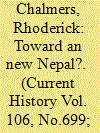

|
|
|
| 16 |
ID:
128221
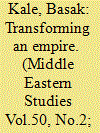

|
|
|
|
|
| Publication |
2014.
|
| Summary/Abstract |
The Ottoman Empire's immigration and settlement policies were redefined in the nineteenth and early twentieth centuries as a result of the population movements caused by the rise of nationalism, wars and territorial losses. With changing demographics and the acceptance of a new citizenship concept by the Tanzimat Edict in 1839, the millet system which had previously secured the multi-ethnic and multi-religious nature of the empire for centuries was challenged. The central argument of the paper is that the Ottoman state responded to these challenges by supporting a liberal migration and settlement policy in an institutionalized and highly complex structure through the pioneering Ottoman Migration Commission. Although certain restrictions later took place due to internal and external factors such as a changing economic, social and political climate, the institutionalized settlement and migration policy proves that a multi-dimensional system was developed in response to the challenges of a dissolving and yet transforming Empire.
|
|
|
|
|
|
|
|
|
|
|
|
|
|
|
|
| 17 |
ID:
145289
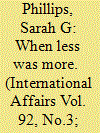

|
|
|
|
|
| Summary/Abstract |
The internationally unrecognized ‘Republic of Somaliland’ presents a case in which the domestic drivers of peace and development may be examined when aid and other forms of international intervention are not significant variables. The relative autonomy of its peace process offers an alternative perspective on post-conflict transitions to that offered in the majority of the literature, which instead problematizes either the perverse outcomes or unintended consequences of international interventions in conflict-affected areas. The purpose of this article is not to establish the salience of Somaliland's relative isolation in its ability to achieve peace and relative political order, as this is already documented in the literature. Rather, it explores the ways in which that isolation fostered mutual dependence between powerful political and economic actors for their survival and prosperity. It uses a political settlements framework to probe the implications of this dependence for western statebuilding interventions in post-conflict situations. The findings present a challenge to orthodox assumptions about how states transition out of conflict, particularly that: greater vertical inclusivity necessarily strengthens a political settlement; effective Weberian institutions are a prerequisite of an enduring peace; and that external assistance is usually necessary to end large-scale violence in developing states or to prevent a recurrence of the conflict.
|
|
|
|
|
|
|
|
|
|
|
|
|
|
|
|
|
|
|
|
|